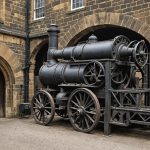Overview of Classic British Toy Soldier Crafting
The classic British toy soldier represents a long-standing tradition in the UK. Originating in the 18th century, these figures have fascinated enthusiasts with their intricate designs. The history of toy soldier making in the UK reveals an evolution from simple lead molds to complex creations using diverse materials such as tin and plastic. This shift reflects advancements in crafting methods and the changing availability of materials over the years.
Initially, toy soldiers were crafted primarily from lead, due to its malleability. However, as awareness of lead poisoning grew, manufacturers sought safer alternatives. This led to a gradual transition towards safer materials. By the mid-20th century, plastic became the preferred choice, allowing for more detailed designs and an increase in production efficiency.
Also to discover : Uncovering the Best UK Cities for In-Depth Tours of British Press Photography History
Despite these advancements, many believe traditional crafting workshops are crucial for preserving this unique aspect of UK toy soldier history. These workshops provide hands-on experiences, allowing enthusiasts and newcomers alike to learn the meticulous techniques involved. Participants can gain practical skills while understanding the cultural heritage of this iconic craft, thus ensuring its continuity for future generations. Through such workshops, the artistry and integrity of classic British toy soldiers continue to be celebrated and sustained.
Top Locations for Toy Soldier Workshops in the UK
Discovering toy soldier crafting venues across the UK offers enthusiasts the chance to indulge in their passion through immersive hands-on experiences. These workshops cater to varying skill levels, providing both beginners and seasoned crafters a place to enhance their skills and enjoy the unique hobby of crafting toy soldiers.
Also to read : Explore the Top UK Festivals for a Deep Dive into Enchanting British Folk Tales
Venue 1: [Location Name]
Located in the heart of the UK, this venue offers a broad array of workshop offerings tailored to all skill levels. Participants can choose from a variety of toy soldier styles to craft, ranging from historical figures to modern renditions. The workshops frequently receive positive feedback for their comprehensive instructional approach and supportive environment. Many participants have expressed satisfaction with the knowledge they gain and appreciate the sense of community within the workshop.
Venue 2: [Location Name]
This venue stands out due to its unique features, such as the use of high-quality, diverse materials that foster creativity and craftsmanship. Beginners will benefit from guided sessions that break down each crafting step, while experienced crafters can explore sophisticated techniques. Recommendations often suggest beginners start with basic soldier designs and materials before advancing to the more intricate options available.
Venue 3: [Location Name]
Specializing in specific workshops focused on different eras and styles, this venue teaches niche crafting techniques that are both traditional and innovative. With a preference for smaller group sizes, attendees receive personalized attention, making the learning process more thorough and engaging. Crafters at this venue often leave with a deeper appreciation for the art and new skills to apply in personal projects.
Types of Workshops Offered
Various workshop formats cater to different skill levels and interests in toy soldier making techniques. For beginners, sessions focus on foundational skills, providing instruction in basic techniques and tools. These workshops are designed to build confidence and ensure participants grasp essential concepts before progressing.
In contrast, advanced workshops delve into intricate techniques, offering participants the opportunity to refine and master their skills. These sessions often cover complex topics such as unique detailing and customisation, providing a challenging yet rewarding experience.
The mode of delivery can also vary significantly. Group crafting sessions foster a collaborative environment, where participants can share ideas and techniques, building on collective creativity. These sessions often encourage networking and socialisation among attendees. Meanwhile, individual crafting sessions offer a more personalised approach, allowing for tailored instruction and feedback, focusing on the unique needs and progression of each participant.
Additionally, many providers offer seasonal or themed workshops, which can align with specific holidays or events. These sessions often feature exclusive projects or techniques that relate to the theme, providing a fresh and engaging experience for both new and returning participants. This diversity in workshop offerings ensures that there are opportunities to suit every crafting enthusiast’s preferences and schedule.
The Crafting Process: Step-by-Step Guide
Creating classic toy soldiers can be both a rewarding and educational process. Whether you’re a novice or experienced craft enthusiast, understanding the material requirements and steps involved is crucial for success.
Materials Needed
Begin by gathering essential materials for the toy soldier crafting process. These include:
- Moulds: Used to shape your soldiers.
- Lead or Metal Alloys: Commonly used for crafting durable and detailed figures.
- Paints and Brushes: For adding personality and detail to your soldiers.
- Protective Gear: Ensure safety with gloves and masks.
Key Steps in Crafting
Once materials are secured, follow these techniques for hands-on learning and achieving professional results:
- Prepare Your Work Area: Ensure it’s well-ventilated and equipped with the necessary safety tools.
- Heat Metal Alloys: Melt them carefully in a crucible following safety guidelines.
- Pour into Moulds: Fill the moulds smoothly to avoid air bubbles, which can weaken the structure.
- Allow Cooling: Once cooled, carefully remove your soldier from the mould.
- Sand and Smooth: Remove any excess metal for a clean finish.
Tips for Workshops
- Emphasize the importance of precision at each stage.
- Encourage experimentation with painting techniques for unique creations.
- Consistently review safety protocols to ensure a positive and secure crafting experience.
Participant Experiences and Reviews
The value of any workshop can be significantly gauged through participant feedback and user experiences. Real insights from past attendees provide an authentic glimpse into the benefits and atmosphere of the workshops, enriching our understanding of their impact.
Testimonials from Participants
Participants often share glowing workshop reviews, praising the hands-on approach and the engaging community environment. “The whole experience was incredibly rewarding,” shared one participant, noting how the session helped enhance their skills while fostering emotional connections. Another attendee highlighted the joy of learning alongside others, stating, “The shared experiences and moments of creativity made it unforgettable.” These testimonials emphasise how such workshops not only improve technical abilities but also create a sense of camaraderie and belonging.
Photo Gallery of Completed Projects
The photo gallery of completed projects provides a vivid display of the variety and creativity stemming from these workshops. Images capture the diversity of items, from handcrafted pottery to intricate paintings. One particularly unique piece was a mosaic inspired by local landscapes, demonstrating how participants draw on both personal and community narratives. These visuals celebrate the accomplished work and offer a platform for participants to enjoy recognition and share their stories with a wider audience.
Booking Information and Tips
When you decide to book a workshop, you’ll find a simple and straightforward process. First, navigate to the workshop webpage where you can select your desired date and time. Once chosen, follow the prompts to complete your booking. Expect a confirmation email detailing your workshop booking and instructions for the event day.
Preparing for your workshop can significantly enhance your experience. Participation guidance often suggests wearing comfortable clothing appropriate for movement or specific activities. Additionally, bringing along a notebook and pen is advisable for jotting down any valuable insights or ideas. Depending on the workshop topic, other items might be recommended, so check the guidelines provided.
Sometimes plans change, and rescheduling or cancelling a workshop might become necessary. Familiarise yourself with the specific rescheduling and cancellation policies before booking. Generally, workshops offer flexible options if you need to change dates or cancel, but these policies can vary. Knowing these details helps avoid any surprise fees or issues later on.
By preparing adequately and understanding these elements, your workshop experience can be both enjoyable and productive. Whether it’s your first time or you’re a seasoned participant, these preparation tips ensure that you get the most out of your workshop.
Additional Resources and Historical Context
Delving into toy soldier history can enrich your understanding of these miniature figures. Some remarkable books capture their evolution and craftsmanship. “Toy Soldiers” by Norman Joplin is a classic, offering an illustrated journey from early models to contemporary designs. Meanwhile, “The Art of the Toy Soldier” by Henry Kurtz and Burtt Ehrlich explores significant historical periods reflected in toy soldiers’ attire and weapons.
For crafting enthusiasts, joining online communities and forums can be incredibly rewarding. Websites like Lead Adventure Forum and The Miniatures Page foster discussions about various crafting techniques and resources, connecting individuals passionate about toy soldier crafting. These platforms are invaluable for sharing insights and collaborating on projects, enriching the collective knowledge base about toy soldier history.
Additionally, keep an eye on upcoming exhibitions that celebrate the artistry of toy soldiers. Historical conventions and exhibitions are fantastic opportunities to witness meticulous craftsmanship firsthand and to meet aficionados who share your interests. These events often showcase rare models and provide workshops, enhancing your appreciation and understanding of toy soldier history further.
Each of these resources offers unique insights into the evolving world of toy soldiers, supporting both historical enthusiasts and crafting aficionados alike.











